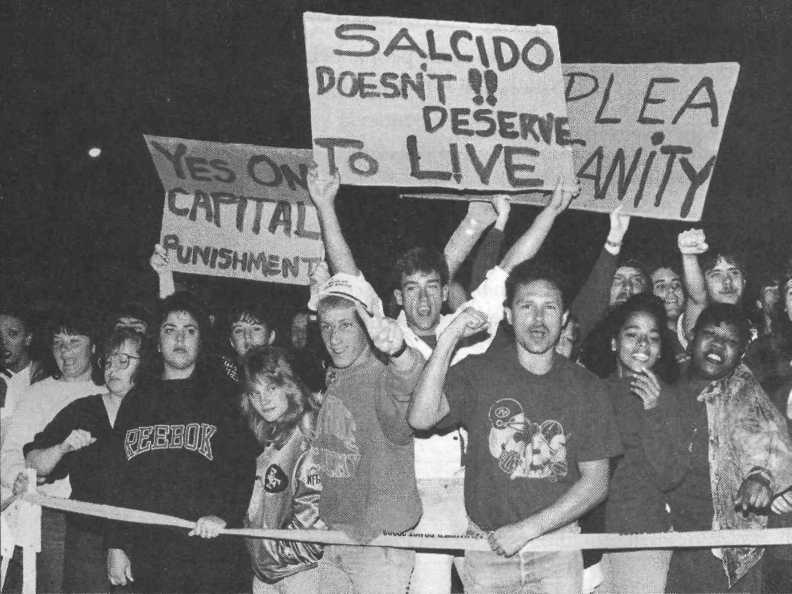Законодательная власть и правоохранительная деятельность в Великобритании и США учебное пособие Уровень В1 Составитель
 Скачать 3.57 Mb. Скачать 3.57 Mb.
|
|
1. Here are some of the sentences possible in an English court.
Now look at these cases. If you were a judge, what sentence would you give to these people? Choose from the chart, give full details (eg. a £1000 fine/3 years in prison/one year on probation) and discuss your decision(s). a. 18-year-old Miranda worked in a shoe-shop. She lost her job when she stole £92 from the shop. b. Nigel is 38. He drank a bottle of wine and then drove home. He had a car accident and killed a 13-year-old boy. c. Kevin, 15, was caught travelling on the train without a ticket. The correct ticket would have cost £1.75. d. Stacey, aged 22, was caught selling marijuana at a disco. At her flat about 50 grammes of the drug were found (value: around £250). e. Dean, 17, broke the window of a new Mercedes and stole a mobile phone and four CDs. f. Samira is 32. She killed her husband with a knife while he was asleep. He had been very cruel and violent with her for more than 10 years, and he often had girlfriends. 2. Work in small groups and discuss these questions:
/from Inside Out. Advanced. Student’s Book. Ceri Jones, Tania Bastow, Sue Kay and Vaughan Jones/ Reading 1 1. Pre-reading  a. You are going to read an article about the role of prisons. First, decide which of these statements you agree with. Jot down some arguments in favour of your position. 1 The best way to deter criminals from re-offending is to make prison as unpleasant as possible. 2 The best way to deter criminals from re-offending is to give them training and education while in prison. b. The article contains a number of quite formal words relating to crime and criminals. Match these words from the text with their neutral or less formal equivalents.
2. Read the base text, ignoring the gaps, and try to follow the development of the argument. Think about these questions. 1 The first paragraph refers to a TV debate. Who are the participants in the debate? What is the debate about? 2 Which views are those of the participants? the writer of the article?
b. Check your answers by reading the whole article in sequence. Does it make sense?
4. a. Briefly note down the arguments presented in the article:
What view of punishment is behind the different approaches? b. Has your opinion about prisons and punishment changed after reading the article? Speaking 2 1. Read the extracts below about the role of prisons and discuss these questions with a partner. 1 Which of the opinions expressed do you most agree with and why? Can you think of any advantages or disadvantages to the solutions described? 2 What, in your opinion, is the purpose of prisons? A I don't believe prison is the answer for most crimes, except really serious ones like murder. But if we do have to put offenders in prison, then surely losing their freedom is enough of a punishment. We don't need to punish them twice for what they've done by making them live in bad conditions. Some people claim that prisons are like holiday camps, but that's just not true. It's our fault if people become criminals, so we should give them a second chance. We've got to offer them an opportunity to study or train so they can do something useful when they get out again. Language Bank Acknowledging opposing ideas ... Certainly, it can be argued that... While I agree/accept that... ... and countering them However, / Nevertheless, / On the other hand, ... ... research has shown that... In fact, ... / The truth is... / The fact of the matter is... It follows that... / Therefore, ... / As a result, ... Asking for/giving clarification I don't (quite) follow you. Do you mean...? What exactly do you mean by ...? Well, you see ... To put it another way ... / In other words,... Summarising, concluding Everything points to the conclusion that... To sum up, I (firmly) believe ... There is no alternative but to ... B It’s currently fashionable to blame unemployment and poverty for criminal acts. But there is no denying the fact that each individual has a choice. Despite difficult circumstances, many people do not turn to crime. Those who do and are caught often re-offend. It’s clear from this that attempts to reform criminals are a waste of time. For these reasons, I believe that prisons should be centres of punishment, not leisure centres or university campuses, and the only way to deter crime is to introduce tougher, longer sentences. 2. Summarise your conclusions for the class. Did you agree or did you have different opinions? /From Fast Track to CAE. Alan Stanton, Susan Morris/ Writing 1 Essay ‘For and Against’ 1. Work with your partner and sum up the advantages and disadvantages of imprisonment as a form of punishment. 2. Read the composition on the advantages and disadvantages of imprisonment as a form of punishment. Fill in each gap with one of the following words or phrases.
For centuries imprisonment has been one of the main means of punishing a criminal in different countries. (1)____________, there is growing evidence that prison is not always the best solution to the problems of crime that people face. Several scientific studies have shown that prison is not nearly as beneficial to society as it might be imagined. (2)_____________, alongside advantages there are disadvantages to imprisonment as a form of punishment. There are some positive sides of imprisonment as a form of punishment. (3)_____________, prison is a social defence against anti-social people. In short, it keeps people safe. (4)_________, prison punishes wrongdoers through their loss of freedom. (5)_____________, it teaches convicts the error of their ways, so that when they are released, they can enter back into daily life as law-abiding citizens. (6)___________, there are certain drawbacks to sending people to prison. (7)______________, the terrible conditions in most prisons mean that imprisoned criminals rarely receive a positive education. Rather, they spend their time inside with other prisoners who can teach them the tricks of their trade. (8)_____________, when they are released, it is very difficult for them to find a job, so they often feel that they have no choice but to reoffend. It is the only thing they know. (9)___________ the truth is that they are more likely to commit crimes again when they are released than if they had not been sent to prison in the first place. (10)______________, it can be seen that as a form of punishment imprisonment has both positive and negative sides. (11)______________, it isolates criminals from society and punishes them by depriving them of freedom. (12)____________, it converts inmates into productive members of society. (13)_____________, prison tends to provide criminals with a negative education and does not offer the opportunities to start a new life. /Adapted from Use of English: Skills for First Certificate. Malcolm Mann, Steve Taylore-Knowles/ 3. Give each of the paragraphs one of the following headings: Conclusion, Introduction, Advantages, Disadvantages. 4. Work with your partner and compare the arguments in the essay with those you put forward before you read. 5. Write an essay discussing the advantages and disadvantages of providing prisoners with education and training. Reading 2 1  . Pre-reading task . Pre-reading task1. First look at the photograph, and discuss these questions: What are the people doing? Where are they? What do their signs mean? 2. Discuss the following questions in small groups.
2. Reading 1. A newspaper editorial gives the writer's opinion about a topic. As with any news article, an editorial begins with a headline or title. | |||||||||||||||||||||||||||

